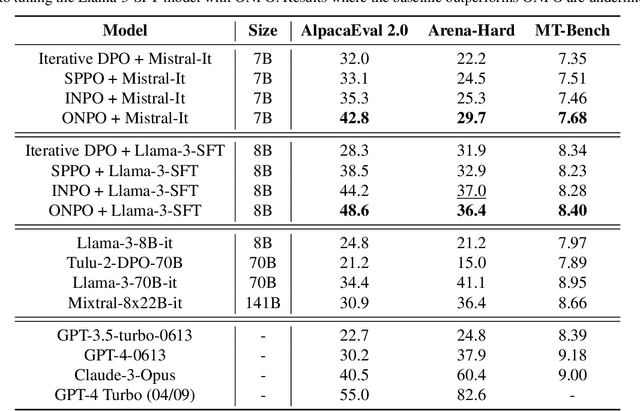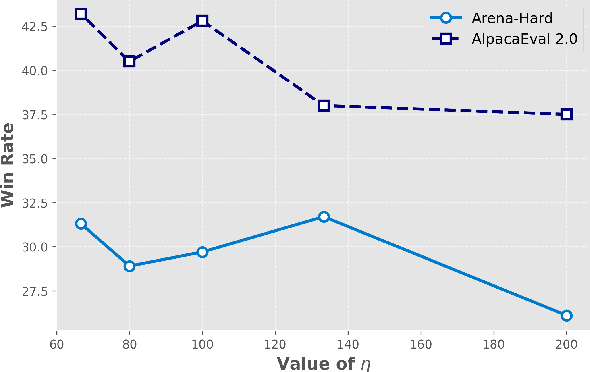Yuheng Zhang
TagSpeech: End-to-End Multi-Speaker ASR and Diarization with Fine-Grained Temporal Grounding
Jan 11, 2026Abstract:We present TagSpeech, a unified LLM-based framework that utilizes Temporal Anchor Grounding for joint multi-speaker ASR and diarization. The framework is built on two key designs: (1) decoupled semantic and speaker streams fine-tuned via Serialized Output Training (SOT) to learn turn-taking dynamics; and (2) an interleaved time anchor mechanism that not only supports fine-grained timestamp prediction but also acts as a synchronization signal between semantic understanding and speaker tracking. Compared to previous works that primarily focus on speaker-attributed ASR or implicit diarization, TagSpeech addresses the challenge of fine-grained speaker-content alignment and explicitly models "who spoke what and when" in an end-to-end manner. Experiments on AMI and AliMeeting benchmarks demonstrate that our method achieves consistent improvements in Diarization Error Rate (DER) over strong end-to-end baselines, including Qwen-Omni and Gemini, particularly in handling complex speech overlaps. Moreover, TagSpeech employs a parameter-efficient training paradigm in which the LLM backbone is frozen and only lightweight projectors are trained, resulting in strong performance with low computational cost.
RoboMIND 2.0: A Multimodal, Bimanual Mobile Manipulation Dataset for Generalizable Embodied Intelligence
Dec 31, 2025Abstract:While data-driven imitation learning has revolutionized robotic manipulation, current approaches remain constrained by the scarcity of large-scale, diverse real-world demonstrations. Consequently, the ability of existing models to generalize across long-horizon bimanual tasks and mobile manipulation in unstructured environments remains limited. To bridge this gap, we present RoboMIND 2.0, a comprehensive real-world dataset comprising over 310K dual-arm manipulation trajectories collected across six distinct robot embodiments and 739 complex tasks. Crucially, to support research in contact-rich and spatially extended tasks, the dataset incorporates 12K tactile-enhanced episodes and 20K mobile manipulation trajectories. Complementing this physical data, we construct high-fidelity digital twins of our real-world environments, releasing an additional 20K-trajectory simulated dataset to facilitate robust sim-to-real transfer. To fully exploit the potential of RoboMIND 2.0, we propose MIND-2 system, a hierarchical dual-system frame-work optimized via offline reinforcement learning. MIND-2 integrates a high-level semantic planner (MIND-2-VLM) to decompose abstract natural language instructions into grounded subgoals, coupled with a low-level Vision-Language-Action executor (MIND-2-VLA), which generates precise, proprioception-aware motor actions.
Improving Deepfake Detection with Reinforcement Learning-Based Adaptive Data Augmentation
Nov 10, 2025Abstract:The generalization capability of deepfake detectors is critical for real-world use. Data augmentation via synthetic fake face generation effectively enhances generalization, yet current SoTA methods rely on fixed strategies-raising a key question: Is a single static augmentation sufficient, or does the diversity of forgery features demand dynamic approaches? We argue existing methods overlook the evolving complexity of real-world forgeries (e.g., facial warping, expression manipulation), which fixed policies cannot fully simulate. To address this, we propose CRDA (Curriculum Reinforcement-Learning Data Augmentation), a novel framework guiding detectors to progressively master multi-domain forgery features from simple to complex. CRDA synthesizes augmented samples via a configurable pool of forgery operations and dynamically generates adversarial samples tailored to the detector's current learning state. Central to our approach is integrating reinforcement learning (RL) and causal inference. An RL agent dynamically selects augmentation actions based on detector performance to efficiently explore the vast augmentation space, adapting to increasingly challenging forgeries. Simultaneously, the agent introduces action space variations to generate heterogeneous forgery patterns, guided by causal inference to mitigate spurious correlations-suppressing task-irrelevant biases and focusing on causally invariant features. This integration ensures robust generalization by decoupling synthetic augmentation patterns from the model's learned representations. Extensive experiments show our method significantly improves detector generalizability, outperforming SOTA methods across multiple cross-domain datasets.
Identifying and Calibrating Overconfidence in Noisy Speech Recognition
Sep 08, 2025Abstract:Modern end-to-end automatic speech recognition (ASR) models like Whisper not only suffer from reduced recognition accuracy in noise, but also exhibit overconfidence - assigning high confidence to wrong predictions. We conduct a systematic analysis of Whisper's behavior in additive noise conditions and find that overconfident errors increase dramatically at low signal-to-noise ratios, with 10-20% of tokens incorrectly predicted with confidence above 0.7. To mitigate this, we propose a lightweight, post-hoc calibration framework that detects potential overconfidence and applies temperature scaling selectively to those tokens, without altering the underlying ASR model. Evaluations on the R-SPIN dataset demonstrate that, in the low signal-to-noise ratio range (-18 to -5 dB), our method reduces the expected calibration error (ECE) by 58% and triples the normalized cross entropy (NCE), yielding more reliable confidence estimates under severe noise conditions.
ArtVIP: Articulated Digital Assets of Visual Realism, Modular Interaction, and Physical Fidelity for Robot Learning
Jun 06, 2025Abstract:Robot learning increasingly relies on simulation to advance complex ability such as dexterous manipulations and precise interactions, necessitating high-quality digital assets to bridge the sim-to-real gap. However, existing open-source articulated-object datasets for simulation are limited by insufficient visual realism and low physical fidelity, which hinder their utility for training models mastering robotic tasks in real world. To address these challenges, we introduce ArtVIP, a comprehensive open-source dataset comprising high-quality digital-twin articulated objects, accompanied by indoor-scene assets. Crafted by professional 3D modelers adhering to unified standards, ArtVIP ensures visual realism through precise geometric meshes and high-resolution textures, while physical fidelity is achieved via fine-tuned dynamic parameters. Meanwhile, the dataset pioneers embedded modular interaction behaviors within assets and pixel-level affordance annotations. Feature-map visualization and optical motion capture are employed to quantitatively demonstrate ArtVIP's visual and physical fidelity, with its applicability validated across imitation learning and reinforcement learning experiments. Provided in USD format with detailed production guidelines, ArtVIP is fully open-source, benefiting the research community and advancing robot learning research. Our project is at https://x-humanoid-artvip.github.io/ .
CryoCCD: Conditional Cycle-consistent Diffusion with Biophysical Modeling for Cryo-EM Synthesis
May 29, 2025Abstract:Cryo-electron microscopy (cryo-EM) offers near-atomic resolution imaging of macromolecules, but developing robust models for downstream analysis is hindered by the scarcity of high-quality annotated data. While synthetic data generation has emerged as a potential solution, existing methods often fail to capture both the structural diversity of biological specimens and the complex, spatially varying noise inherent in cryo-EM imaging. To overcome these limitations, we propose CryoCCD, a synthesis framework that integrates biophysical modeling with generative techniques. Specifically, CryoCCD produces multi-scale cryo-EM micrographs that reflect realistic biophysical variability through compositional heterogeneity, cellular context, and physics-informed imaging. To generate realistic noise, we employ a conditional diffusion model, enhanced by cycle consistency to preserve structural fidelity and mask-aware contrastive learning to capture spatially adaptive noise patterns. Extensive experiments show that CryoCCD generates structurally accurate micrographs and enhances performance in downstream tasks, outperforming state-of-the-art baselines in both particle picking and reconstruction.
Panoramic Out-of-Distribution Segmentation
May 06, 2025Abstract:Panoramic imaging enables capturing 360{\deg} images with an ultra-wide Field-of-View (FoV) for dense omnidirectional perception. However, current panoramic semantic segmentation methods fail to identify outliers, and pinhole Out-of-distribution Segmentation (OoS) models perform unsatisfactorily in the panoramic domain due to background clutter and pixel distortions. To address these issues, we introduce a new task, Panoramic Out-of-distribution Segmentation (PanOoS), achieving OoS for panoramas. Furthermore, we propose the first solution, POS, which adapts to the characteristics of panoramic images through text-guided prompt distribution learning. Specifically, POS integrates a disentanglement strategy designed to materialize the cross-domain generalization capability of CLIP. The proposed Prompt-based Restoration Attention (PRA) optimizes semantic decoding by prompt guidance and self-adaptive correction, while Bilevel Prompt Distribution Learning (BPDL) refines the manifold of per-pixel mask embeddings via semantic prototype supervision. Besides, to compensate for the scarcity of PanOoS datasets, we establish two benchmarks: DenseOoS, which features diverse outliers in complex environments, and QuadOoS, captured by a quadruped robot with a panoramic annular lens system. Extensive experiments demonstrate superior performance of POS, with AuPRC improving by 34.25% and FPR95 decreasing by 21.42% on DenseOoS, outperforming state-of-the-art pinhole-OoS methods. Moreover, POS achieves leading closed-set segmentation capabilities. Code and datasets will be available at https://github.com/MengfeiD/PanOoS.
Statistical Tractability of Off-policy Evaluation of History-dependent Policies in POMDPs
Mar 03, 2025Abstract:We investigate off-policy evaluation (OPE), a central and fundamental problem in reinforcement learning (RL), in the challenging setting of Partially Observable Markov Decision Processes (POMDPs) with large observation spaces. Recent works of Uehara et al. (2023a); Zhang & Jiang (2024) developed a model-free framework and identified important coverage assumptions (called belief and outcome coverage) that enable accurate OPE of memoryless policies with polynomial sample complexities, but handling more general target policies that depend on the entire observable history remained an open problem. In this work, we prove information-theoretic hardness for model-free OPE of history-dependent policies in several settings, characterized by additional assumptions imposed on the behavior policy (memoryless vs. history-dependent) and/or the state-revealing property of the POMDP (single-step vs. multi-step revealing). We further show that some hardness can be circumvented by a natural model-based algorithm -- whose analysis has surprisingly eluded the literature despite the algorithm's simplicity -- demonstrating provable separation between model-free and model-based OPE in POMDPs.
Improving LLM General Preference Alignment via Optimistic Online Mirror Descent
Feb 24, 2025


Abstract:Reinforcement learning from human feedback (RLHF) has demonstrated remarkable effectiveness in aligning large language models (LLMs) with human preferences. Many existing alignment approaches rely on the Bradley-Terry (BT) model assumption, which assumes the existence of a ground-truth reward for each prompt-response pair. However, this assumption can be overly restrictive when modeling complex human preferences. In this paper, we drop the BT model assumption and study LLM alignment under general preferences, formulated as a two-player game. Drawing on theoretical insights from learning in games, we integrate optimistic online mirror descent into our alignment framework to approximate the Nash policy. Theoretically, we demonstrate that our approach achieves an $O(T^{-1})$ bound on the duality gap, improving upon the previous $O(T^{-1/2})$ result. More importantly, we implement our method and show through experiments that it outperforms state-of-the-art RLHF algorithms across multiple representative benchmarks.
Teaching LLMs to Refine with Tools
Dec 22, 2024



Abstract:Large language models (LLMs) can refine their responses based on feedback, enabling self-improvement through iterative training or test-time refinement. However, existing methods predominantly focus on refinement within the same reasoning format, which may lead to non-correcting behaviors. We propose CaP, a novel approach that uses external tools to refine chain-of-thought (CoT) responses generated by the same or other LLMs. CaP employs a two-stage training process: supervised fine-tuning followed by preference optimization with DPO variants. Our observations highlight the critical role of preference optimization in enabling effective refinement. Additionally, we compare several sampling strategies to leverage CoT and tools at inference time. Experimental results demonstrate CaP's potential for effective cross-reasoning refinement and efficient inference.
 Add to Chrome
Add to Chrome Add to Firefox
Add to Firefox Add to Edge
Add to Edge